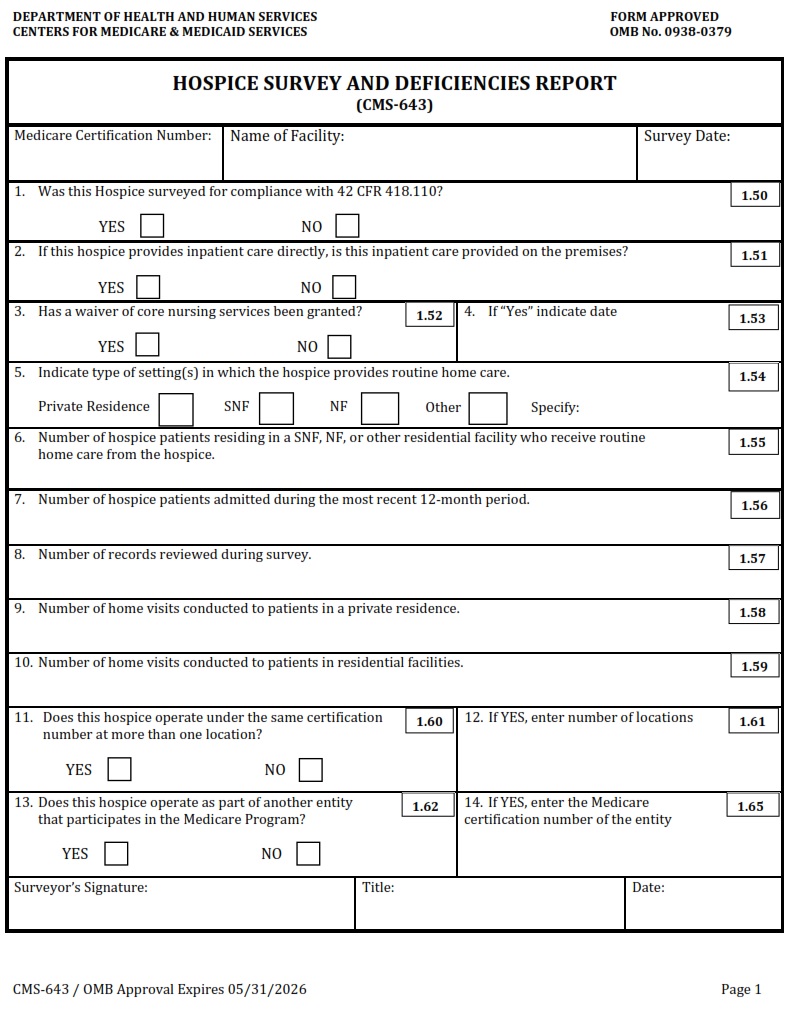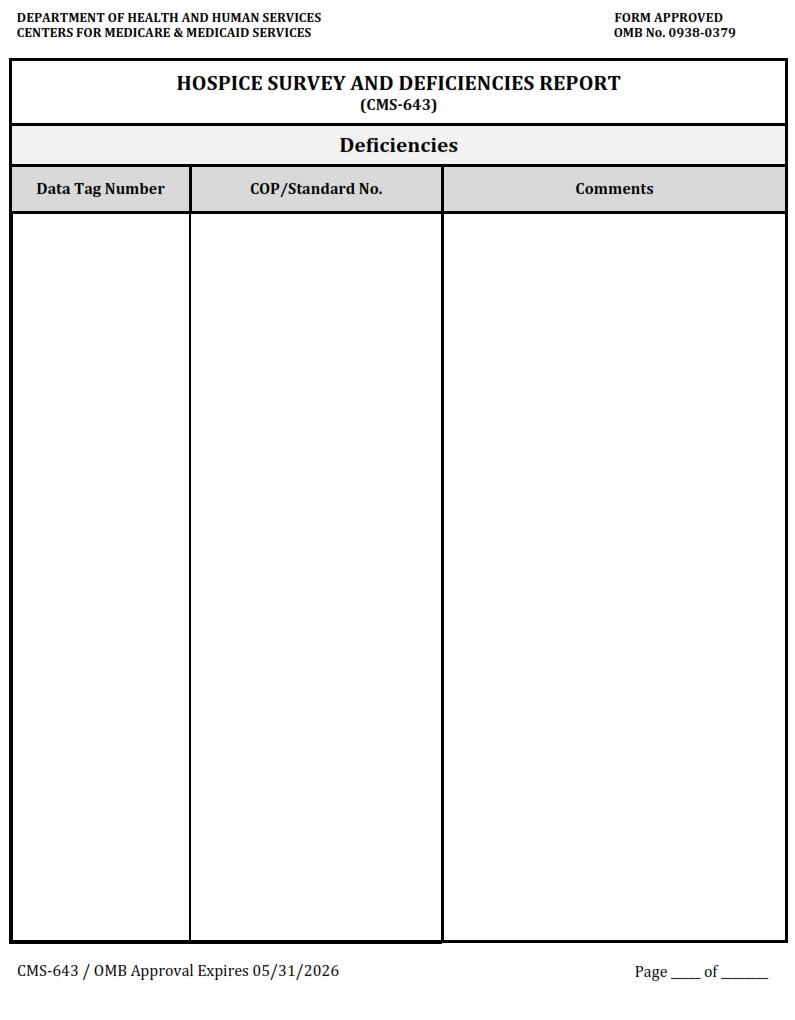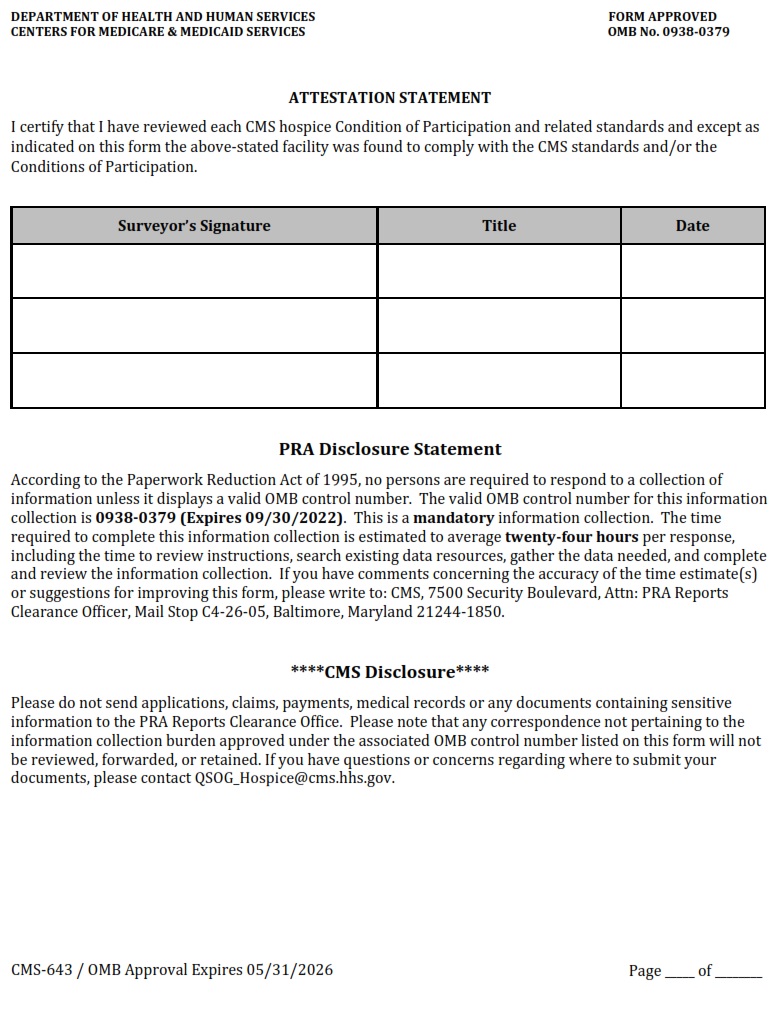CMSFORM.ORG – CMS 643 – Hospice Survey AND Deficiencies Report – In the complex and ever-evolving landscape of healthcare regulation, the Centers for Medicare & Medicaid Services (CMS) plays a crucial role in ensuring quality care for vulnerable populations. One such program under CMS’s scrutiny is Hospice Care, a vital service that provides comfort and support to terminally ill patients and their families during life’s most challenging moments. The release of the CMS 643 – Hospice Survey AND Deficiencies Report sheds light on the state of hospice care across the nation, revealing both commendable practices and areas in need of improvement. This comprehensive report serves as a beacon guiding providers, policymakers, and advocates towards achieving excellence in end-of-life care while upholding the highest standards of patient safety and dignity. Join us as we delve into this invaluable resource, exploring its findings and implications for the future of hospice services in America.
Download CMS 643 – Hospice Survey AND Deficiencies Report
| Form Number | CMS 643 |
| Form Title | Hospice Survey AND Deficiencies Report |
| Published | 2008-06-01 |
| O.M.B. | 0938-0379 |
| File Size | 178 KB |
CMS 643 (28 KB) - Hospice Survey AND Deficiencies Report (2259 downloads )
What is a CMS 643?
A CMS 643 (28 KB) form plays a crucial role in the hospice industry by serving as a survey and deficiencies report that assesses the quality of care provided to patients. This standardized document, designed by the Centers for Medicare & Medicaid Services (CMS), contains detailed information about various aspects of hospice care, such as patient assessments, pain management, and compliance with regulatory requirements. Hospice providers use this form to maintain accountability, identify areas for improvement, and ensure that they meet the necessary standards of care.
By utilizing the CMS 643 (28 KB) form effectively, hospice organizations can enhance their operations and strive towards achieving optimal patient outcomes. The data gathered from these surveys not only help providers track their performance but also enable them to implement evidence-based practices that promote quality end-of-life care. Understanding the significance of this document is essential for hospice administrators, clinicians, and staff members to uphold best practices in delivering compassionate and effective care to terminally ill patients.
Where Can I Find a CMS 643 (28 KB)?
If you’re on the hunt for a CMS 643 (28 KB) form, look no further than the Centers for Medicare & Medicaid Services (CMS) website. This crucial document is an essential tool for hospice providers to report survey and deficiencies information in order to comply with regulations. By accessing this form directly from the CMS website, providers can ensure they have the most up-to-date version and stay in compliance with federal guidelines.
The CMS 643 (28 KB) form serves as a key resource for hospice agencies to maintain transparency and accountability in their operations. By diligently completing this form, providers can demonstrate their commitment to delivering high-quality care while also identifying areas for improvement. Keeping a close eye on survey results and deficiencies allows hospice agencies to address any shortcomings promptly and ensure they are providing top-notch care to patients in need.
CMS 643 (28 KB) – Hospice Survey AND Deficiencies Report
In the realm of hospice care, compliance with regulations and standards is paramount to ensuring high-quality end-of-life services. The CMS 643 (28 KB) Hospice Survey and Deficiencies Report serves as a tool for evaluating hospice providers’ adherence to the guidelines set forth by the Centers for Medicare & Medicaid Services (CMS). By analyzing survey data and identifying deficiencies, this report plays a crucial role in promoting transparency and accountability within the hospice industry.
One key takeaway from the CMS 643 survey is the emphasis on patient-centered care and patient rights. Providers are evaluated on their ability to respect patients’ autonomy, preferences, and decision-making processes throughout their hospice journey. Moreover, deficiencies related to patient safety protocols and infection control measures highlight the importance of maintaining a safe environment for both patients and healthcare staff. By addressing these gaps in care delivery, hospice providers can enhance the overall quality of services provided to individuals approaching end-of-life.
Overall, the CMS 643 Hospice Survey report offers valuable insights into areas where improvement is needed within hospice organizations. By leveraging these findings as opportunities for growth and enhancement, providers can elevate their level of care delivery and ultimately improve outcomes for those under their care during life’s final chapter.


